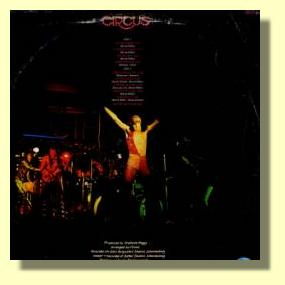Circus - In The Arena

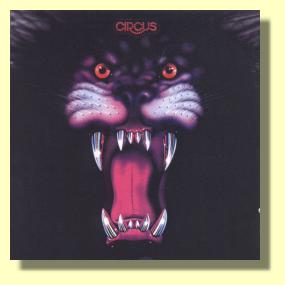
Tracks:
- In The Arena (Bernie Millar) [4.25]
- Liberated Lady (Bernie Millar) [5.17]
- Stupid Boy (Bernie Millar) [2.59]
- Conquistador (Reid/Brooker) [5.46]
- Long Legged Lady (Waterman/Bennett) [2.50]
- Speed Queen (Bernie Millar/Sandy Robbie) [2.42]
- I Wanna Be Free (Bernie Millar/Gary van Zyl) [4.58]
- In Spite Of It All (Bernie Millar) [4.00]
- Michelle (Bernie Millar/Bones Brettell) [5.06]
Musicians:
Release information:
LP: 1977, EMI, GBL(I) 507
CD: July 2001, RetroFresh, freshcd116
Buy this CD from Fresh Music 
Comments:
'Conquistador' is a brilliant cover version of the Procol Harum classic. Released as a single in 1977 on the Sunshine label, cat no: GBS 127.
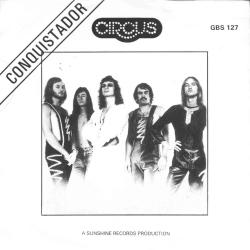 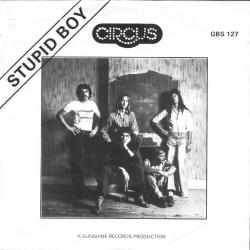
Liner notes:
For those about to rock...
the Circus story
Circus ruled in South Africa's wildcat club culture of the mid-1970s - an original
band, with a theatrical approach to their songwriting in the ballpark of David
Bowie, Elton John, and New York's Lou Reed and Iggy Pop. Not that they were
copying anyone. It's just that when the pop market is on a roll, bands bounce
off one another as they follow the momentum. That's when unknowns can break
into the big time every week with their own twist on what's happening. That
was Circus's edge. Everything they touched in their glorious 30-month run from
1976-8 set a new level of excitement in the biggest clubs of the Reef and the
Coast. They stayed true to themselves, and wound up broken by the SABC's
Tannie morality and the profit motive of the record companies. But they showed
the way in the time of massive change in the music market. The Windrich
brothers of éVoid and Jonathan Selby of Petit Cheval were regulars at Circus
jams. In the pre-Punk era maybe Circus were South Africa's New Romantics. They
were professional musicians, all under 23, with unshakable faith that they had
what it takes to get to the top of the world charts. And in 1978 they proved
it. Circus musicians arranged and backed the "all girl" group Clout's first
single, Substitute; within months it was vying for the Number One slot
throughout Europe with the Grease movie anthem, "You're the one that I
want". "Substitute" sold nine million copies - hell, it sold around 250 000 in
South Africa alone, as popular in Soweto and Mitchell's Plain as it was in
Sandton and Booysens. The Circus musicians were paid R34 each for the
arrangement and backing the session. It was just another daytime gig -
pocket-money for club favourites who were making R1 200 a month each from door
money. For them, backing a Clout single was just another step in their
progress from Hillbrow to Hollywood. Just like Clapton playing on the Beatles
White Album. It didn't threaten their own career: this album, In The Arena,
had just been released.
Life was good and everyone could afford to be generous.
Producer Grahame Beggs had the local rights for the string of 70s Abba hits,
and he signed up Circus and Clout to pursue local success in similar glitter
outfits. But when Clout's first single became the instant dance sensation of
Europe's summer of '78, not everyone's priorities remained on the same page.
Making money takes precedence over making music, and Circus were sidelined by
the same kind of greed that prevailed when another form of gold had put
Jo`burg on the map a century earlier. Which is sad, because Circus deserved an
even break. And if they'd got it, this 1977 album shows they had original
material for at least three singles. Long Legged Lady, Stupid Boy and Speed
Queen were all club favourites, and all original songs. They each took a
different approach to commercial hit formulas - in the manner of
Lennon-McCartney's Sergeant Pepper album, or Brian Wilson's Pet Sounds, or the
Tim Rice-Andrew Lloyd Webber rock operas.
In those days, singles sold albums. Long Legged
Lady was the sexy love song; Stupid Boy was the tragic ballad; and Speed
Queen was Circus at full power, challenging bands like Deep Purple and Grand
Funk Railroad at their own game. The rhythm section's tight, the keyboards are
sleek and inventive, and the lead guitar breaks are fast and assured. This was
a band honed, like all fine rock bands, on 300 club gigs a year. They knew
what worked, and they were shaping their own place in the future.
Singer/lyricist Bernie Millar sets the scene in the opening tracks - the
curtain-raising In the Arena, and then the teasing Liberated Lady, burning her
bra and letting it all hang out to mock the sexist pig on the bandstand.The
only cover version in the nine tracks on this CD is Procol Harum's
Conquistador. It's a far more exciting version than the old Whiter Shade
of Pale group could come up with themselves, and its lyrics - about the
haughty Spanish invaders coming to grief against the ancient Incas in a
different southern continent. It appealed no end to Circus, who had their own
cross to bear in the shape of broadcasters who still claimed to be outraged by
the Beatles saying they had more fans than God. "We formed the band in 1975 to sell our own brand
of theatre rock to South African audiences," says frontman Bernie Millar. "We
had a million ideas for songs and there was a demand for good rock with a
flashy stage act. It was all about the writing. Shit, the stuff in demand
overseas was so over the top that we knew the world was wide open for us. We
just went for it."
Bernie and Ron 'Bones' Brettell (keyboards) launched 'Rock
n 'Roll Circus' in Port Elizabeth, and with the introduction of ex-Tank
members Gary van Zyl (bass), Wally Cullis (drums) and Sandy Robbie (lead
guitar) at a later stage, the name was abreviated to 'Circus'. Pictures back
then show the same shaggy manes and dodgy moustaches as worn by the jaded Led
Zep and the fast-rising Def Leppard. The same glint in the eyes, fuelled by
free drinks, willing chicks and high-wattage testosterone. The big difference
in the line-up was Bernie Millar - the one with the mascara dripping down his
face and large sweaty patches in his skimpy, spangled jumpsuits. Ziggy
Stardust on 12 cans of Castle and a bottle of hardtack a night. They'd worked
out their ideas in two years along the coast's hard-partying club strip. It
was joyous, no-shit, never complain, knob your tarts and drain your wine
cellar, brand of glam rock. It kicked. The songs were geared for good
times, manic enough to drive you brainless on the dance floor - but with hooks
and lyrics to keep you coming back every week. It was saloon-bar theatre, with
no concessions made to the pretensions of Johannesburg's glitzy discos and
gay clubs. Which didn't endear them to the pink mafia that ruled the pop
broadcast media. By the time they arrived north of the Vaal in 1976, Circus
was the hottest club attraction in the country. Acts like Tina Turner, Tom
Jones and George Macrae were playing the emporiums along Commissioner Street
but a block away Circus was packing them in too. Night after night their fans
happily exceeded the fire hazard regulations in Pretoria's OK Corral, and
Hillbrow's Bella Napoli. The queues outside these places stretched two blocks
long.
The band also had their own outrageous ideas about making an impact on
TV. These were early days for the SABC's single TV channel and bland imports
like Sweet and Gary Glitter were as far as the suits at Auckland Park were
prepared to allow. When Elvis died on August 1977 they didn't even run a
tribute programme. Times were ripe for rebellion. It came with the release of
Long Legged Lady, a spicy four-bar riff into Millar's cocky opening: "She
struts by with a red dress on/She don't look in my eye/She don't don't hear my
song." A clever marketing strategy was required: it had to be funky to stand
out on Pop Shop, without offending the Nats on the SABC's 'Acceptance
Committee' - a group of self-interested career clerks who banned records from
airplay if they felt any single word or line could upset the State, the
Church, the Family or any other friends in powerful places. So Circus
opted to back the tourism drive by featuring a cheetah on the video. The
long-legged spotted lady would prowl the stage alongside Bernie and put South
African music into world class along with the game reserves. Masterstroke.
So a club gig was videotaped for TV. One midweek evening hundreds of loyal
Circus supporters packed into Ciro's club, a plush mirrored basement opposite
the Carlton Centre, to stoke up the atmosphere. The cheetah, a movie
stunt-feline hired from a game park, was parked on the front of the small
stage and Bernie edged into position behind the mike. When Sandy strummed the
opening chord the cat laid its ears flat. Then it all turned into Loony Toons.
When the bass drum slapped on the third bar and Bernie swung his mike up, the
Cheetah lifted off like a SAM missile. Bernie went backwards across the drums,
Sandy and Gary jumped sideways off the stage, and the terrified cat tore
across the dancefloor, ripped into the camera crew, and took refuge under the
tables. It was not a moment for bravado or cool poses: the A-list of Joburg's
club glitterati fled screaming up the celebrated Ciro's staircase or through
the kitchen doors like passengers in the final reel of Titanic. That's why
Circus ended up recording Long Legged Lady for Pop Shop without the cheetah.
It was historic footage, because the SABC banned it before it was broadcast.
No reasons were given, but it emerged that a manager of TV1 didn't like
Bernie's nipples showing as his jumpsuit opened on his naked chest. The
eye-shadow didn't help either. The story ran Page One in the weekend press and
the SABC wound up as usual looking like clowns. Which led to its national pop
station Radio 5 joining the laager by refusing to play Circus records.
The tape was wiped, naturally. State assets like Armskor's nuclear weapons, the Steve Biko interview tapes and Pop Shop music videos were not public property. It wasn't a proud moment in 1977's chapter of
SA pop, and the fracas didn't do Circus any good. No matter how hot a
band's reputation in clubs, it's their record sales and TV exposure which open
the way to international success. And by then, too, another influential leggy
lady had entered the picture. Glenda Hyam, the impressive keyboard player and
singer for Pendulum - another popular club band on the circuit - came up with
the idea for an all-girl band, after she'd seen Joan Jett and the Runaways
knocking 'em dead in LA. A local version seemed like a cute idea, until
producer Grahame Beggs' wife Christine suggested they record the old Righteous
Brothers album track Substitute. Once that bandwagon got rolling in November
'77, Circus was headed for the footnotes. It was Clive Calder - the South
African who today owns the world's biggest independent pop empire (Britney
Spears, 'N Synch, R Kelly, The Backstreet Boys) - who first tipped Bernie off
about Circus's short-term prospects. "He was here on a visit from London,"
Bernie recalls. "We were sitting outside by the pool at some party. Clive
was desperate to sign up Clout; he told me they'd be the next big thing in
pop. I knew he'd never get them, but I also knew it would finish Circus. It
was one of those moments when you flash that one dream is over and you need to
move on." The clubbers were tending to go out late on Tuesday nights, delayed
by watching the new Dallas episodes on the box. Soaps were sweeping into pop
culture. Bernie Millar had met Glenda before Clout recorded their first hit.
That's her playing the castanets - badly at first, (cause no one was sober when
the track was being finished) - on Conquistador. Sparks flew, and then she
went off on tour overseas for most of 1978 while Circus stayed home, still in
demand on the club circuit. But while Clout was never away from the TV cameras
on pop shows like Top of the Pops and Musik Laden, Bernie and the boys were
downplayed by the media here. It couldn't last. In August, Glenda came home
and married Bernie. Bones and Sandy initially and much later Gary, took off to
join the jet-set lifestyle as Clout's real band on tour for the next three
years.
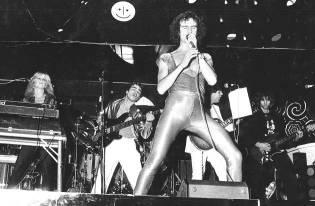
"We were a huge club band who made one good album,"
says Ron Brettell today. "But it would be interesting to see what we could
come up with now," adds Bernie Millar. They're all highly successful musicians
with their own recording studios. Guitarist Sandy Robbie digitally
remastered this re-release of In The Arena, after Retro Fresh chief Benjy
Mudie - formerly bass player with a fledgling éVoid and a die-hard Circus
follower - found the original EMI master tapes. It's state-of-the-art. Back in
1977, local recordings were always top-heavy, to counter the effect of the
shitty vinyl pressings. This is Circus up close and personal, staking their
lives on making it big with their first throw of the dice. It didn't
happen, but only because these five guys were in the right place at the wrong
time. Talent wasn't an issue. After Clout, Gary van Zyl toured the US and
Europe with Johnny Clegg and Sipho Mchunu, as Juluka became the next South
African sensation. Glenda Millar was on keyboards. Wally Cullis toured with
Stingray; Ron Brettell backed PJ Powers in Hotline. Bernie took the lead role
in a local production of 'The Ancient Mariner' and later wrote Little Sister's
top-seller 'Dear Abbie' with Sandy, who became a member. "Okay, we were pissed
off that Circus didn't crack it at the time," Ron concludes. "I can still see
Sandy dropping his guitar in its case after our last gig, saying 'Another good
band bites the dust'. But that's rock and roll. We believed we were the best
around when we made this album and no one can take that away."
Doug Gordon
May 2001
Webpage:
Sources:
Information and cover scans kindly supplied by Andrew King, July/August 1999. Picture single cover scans from Tertius Louw, March 2000. CD supplied by Fresh Music, July 2001. Liner notes reprinted from the RetroFresh website with kind permission of Benjy Mudie

 South Africa's Rock Classics
South Africa's Rock Classics
South Africa's Rock Legends
|
